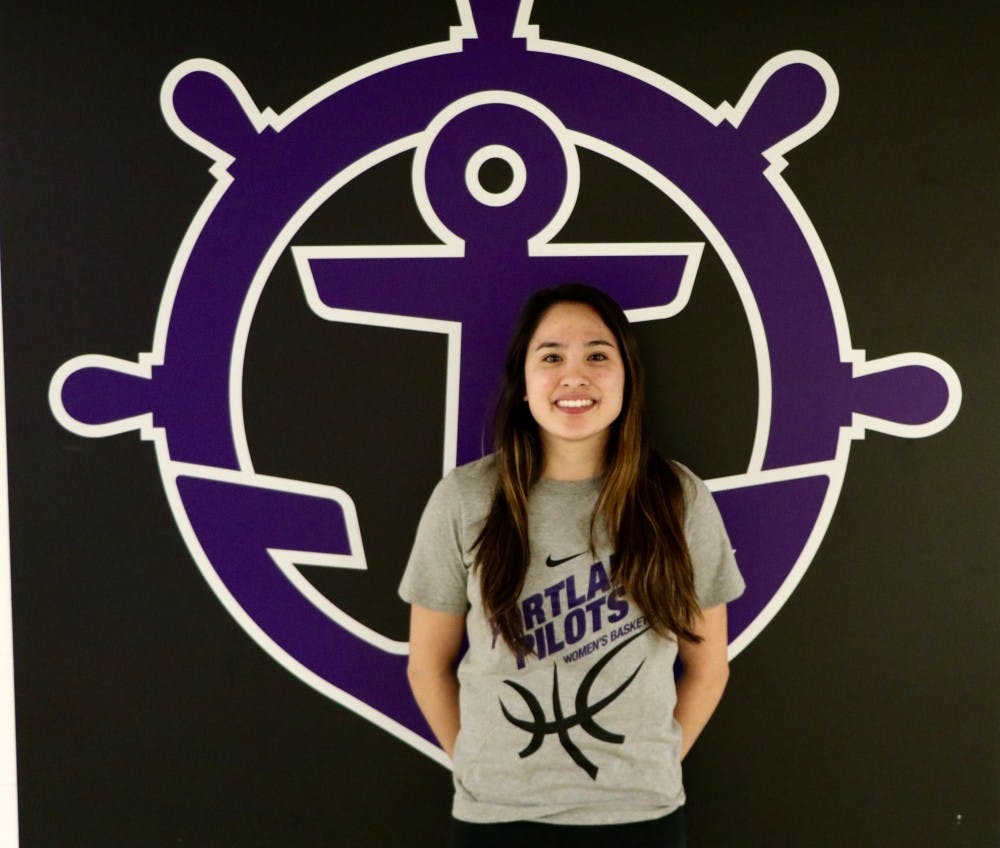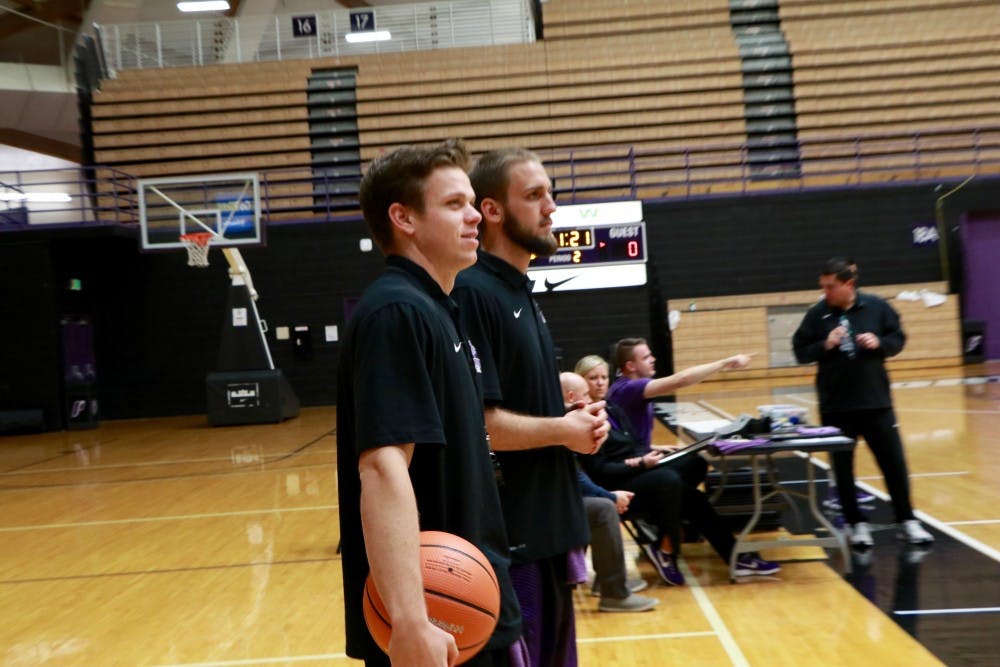Senior Sam Harris and junior Dane Swanson stand off to the side while they watch the University of Portland men’s basketball team start running through its first drills of practice at 9 a.m. Both of them have a basketball in hand, and Swanson carries a towel on his waist. When a basketball goes out of bounds, Harris throws his in, and retrieves the other one. When a drill is over, Swanson steps onto the court with his towel, and wipes off any sweat he sees on the ground to keep the players from slipping. But besides this, the team managers don’t appear to have much to do other than just wait and watch.
Seems easy enough. Except it isn’t. Because Harris and Swanson don’t get to just wander into Chiles and watch the Pilots play. They have to wake up before everyone else to get there before the rest of the team, and make sure that both the players and staff members have what they need to run a smooth practice. They have to come with energy, because at any moment coach Terry Porter could ask them to step in and participate in a drill.
But practices are the easier part of being a team manager. Besides having to attend three-hour practices, managers also work home games, and in some cases, away games. Managing a team at UP takes both time and effort, much more than any other 10-hour per week desk job students can get on campus. But unlike students who work desk jobs, team managers do not get paid.
All work and no pay
Harris and Swanson attend, on average, two practices per week, switching days of the week with the other managers and switching days with someone if necessary. But as the only manager for the women’s basketball team, sophomore Lexi Owens attends every practice.
Like the men’s basketball managers, she arrives at Chiles early. She sets up what the coaches and players will need for the practice, and then sets up what she will need. Owens used to film practices and scrimmages for the team to watch later, but now she’s upgraded to documenting hustle stats, writing down every steal, defensive rebound, charge, etc.
Outside of practice, Owens helps with planning for away games, looking up which hotels they’ll stay at, where the team can meet to watch film, where the team will eat, and more. During games, she’s back at hustle stats, while also keeping track of who plays and for how long.

For any manager traveling with the team, their unpaid position becomes a 24-hour job; one that sometimes means missing Thanksgiving break or part of winter break. While the team isn’t playing, the managers are making sure its uniforms are clean and ready. Men’s basketball managers keep water bottles and snacks for the players in their rooms. They’re also in charge of bringing suitcases filled with equipment. During a road trip to Vegas — his last one with the team — UP alum (‘17) and former men’s basketball team manager Collin Haahr left behind one of the five suitcases he was responsible for back on campus. Luckily, the suitcase only held clipboards and stools.
“It was probably the biggest mess-up I ever had, but best timing,” Haahr said. “Easily best timing because no one was actually that mad.”
But mistakes are not make-or-break for students who dedicate their time to running a team. Coaches know that the managers are still students who have to balance a class schedule with all the work they do on the sidelines, Harris said.
“It’s busy sometimes,” he said. “I don’t get paid, so it’s like volunteer work. Sometimes it’s kind of hard to go. Especially when you have exams during the week and stuff. But most of the time the coaches understand that.”

If students are aware of what team managers do at all, many might see the role as essentially a “waterboy,” but Swanson says that managers do a lot more than setting up chairs and getting water for players during the games.
“They need you in practice,” Swanson said. “Without [the team managers] it’s a lot harder to make guys better because if a guy has to keep shooting and going and getting his own rebound, it would take him probably three times as long to get the amount of shots that he needs to do. So, I feel like you make enough key differences to make it worth your while.”
For the love of the game
Owens played basketball all the way up through high school, and although she knew heading into her freshman year that she would not play for UP’s women’s team, she was set on keeping the sport in her life. When Tiffany Gibson, the director of operations for the women’s team, offered her the position of team manager, Owens immediately agreed.
“When I’m taking statistics or when I’m doing the clock, me and [Gibson] — who has one of the highest basketball IQs that I know—we like just analyzing the game, analyzing our players’ actions,” Owens said. “That’s actually my favorite part because I just love the game.”
This narrative echos the experience of most team managers. After playing a sport for many years, the game got under their skin, and they found themselves looking for a way to keep it in their lives or to stay as part of a team.
“I played basketball in high school,” Swanson said, “But when I was a senior, I kind of came to the realization that I was not tall enough or big enough to play college ball. But I wasn’t ready to say ‘goodbye’ to basketball yet.”
Swanson started managing his freshman year like Owens, while Harris and Haahr, both of whom also played in high school, started their junior years.
Mele Moimoi, another class of 2017 alum, played for the University of Portland women’s volleyball team for two-and-a-half years before she quit going into the second semester of her sophomore year. Like other former student-athletes at UP, she chose to focus more on her academics. But to stay in the game, she came back to the team as a manager after the former head coach, Brent Crouch, offered her the position.
“In the very beginning of being a manager, I did miss playing because I played for a very long time,” Moimoi said. “But at the same time, you just kind of have to step back and celebrate with the girls when they get a win...I’m just really thankful that Brent gave me that opportunity.”
While others may see students who are giving up free time for a job that requires too much, the team managers themselves do not see it that way. Their enthusiasm for their work is rooted in the fact that they simply love the sport.
“I just — I really like basketball...I feel like you wouldn’t be able to do this if you didn’t really like basketball because they don’t pay you anything,” Swanson said. “It’s all kind of off your passion for it.”
And for the team

As they work for weeks with the team throughout the season, and spend countless hours with the athletes while traveling, the managers slowly integrate with the players, eventually becoming like another teammate.
But it can be difficult to get to this point, where the athletes and staff can trust that the managers are there for the right reasons. The best team managers show their dedication and passion for the game through consistency, Haahr said.
“It’s one of those things where you can get real tough love because they want to make sure that you’re working as hard,” Haahr said. “And sometimes they might doubt that, whether it’s the coaches or the players. It’s one of those things where you have to constantly show you’re in it for the team.”
Moimoi said that in becoming a team manager, he was looking for the same camaraderie that came from playing the sport back in high school. In fact, that feeling of being almost like a teammate again is what motivated him most.
“Being a part of a team that I considered family...no one treated me differently,” Moimoi said. “When we got that win, I realized that I was a part of it.”
And when teams lose, the managers feel like a part of it, too. After a difficult 2016-2017 season for the men’s basketball team, Haahr was just as eager to get a win as the players were. At a home game against St. Mary’s, Haahr said he gave his all in ensuring that everything was ready for the game, hoping to make things run as smoothly as possible. When the team lost by one point, he said he was more disappointed than anyone else on the court. Three members of the team — Alec Wintering, Bryce, and Rey — walked over, sat him down, and comforted him, validating his hard work and dedication to the program.
“Probably from that moment on, I knew that it was something that wasn’t just like a job,” Haahr said. “They realized how much I cared about it, and then I realized how much they actually cared about me. A lot of ups and downs with the basketball team…but I don’t regret a second of it because of moments like that.”








